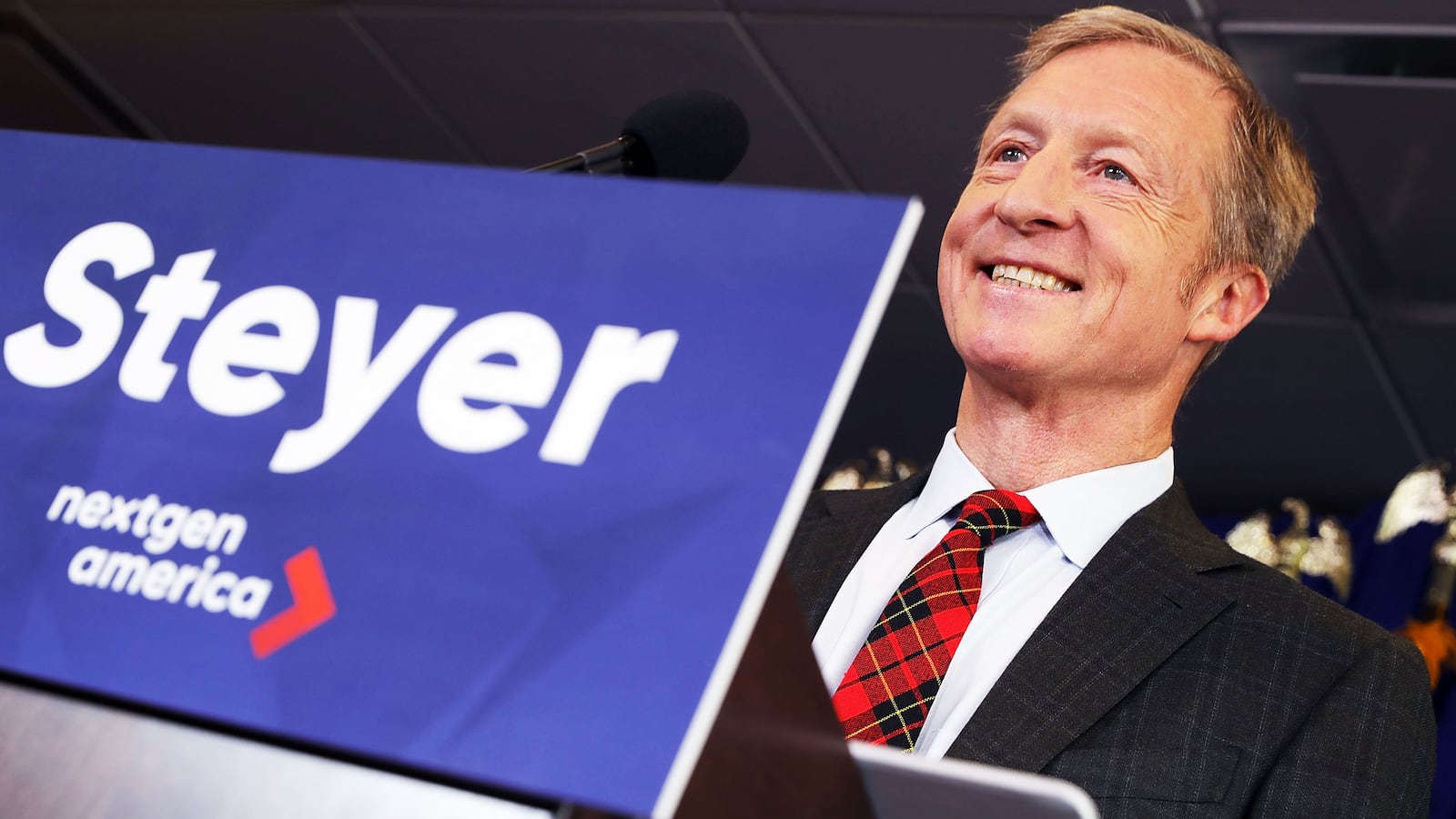Since entering the presidential contest less than three weeks ago, Tom Steyer has outpaced every 2020 candidate in digital spending except for President Trump.
According to data collected by Bully Pulpit Interactive, an online communications agency that is tracking digital spending by the candidates, the liberal billionaire impeachment activist has spent almost $500,000 on Facebook advertising and nearly $250,000 on Google since entering the race on July 9.
From July 6-20, the latest data pulled on the site, Steyer’s campaign spent almost $745,000 on Facebook and Google, compared to over $479,000 from top-tier candidate Sen. Bernie Sanders (I-VT) and $478,000 from South Bend Mayor Pete Buttigieg. Since the beginning of the year, Sen. Elizabeth Warren (D-MA) has led the field with around $3 million spent on Facebook and Google, a number that is only four times as much as Steyer has spent in just two weeks in the race. The only one who has spent more than Steyer in that span is Trump, whose campaign devoted a whopping $1.4 million to Facebook and Google during that time.
The spending from Steyer, part of a promised $100 million he has pledged for this long-shot bid, reflects both the luxuries of running a self-funded campaign as well as the growing urgency of candidates to meet the higher donor thresholds for the upcoming September debate. The Democratic National Committee is requiring that candidates reach 130,000 unique donors and hit 2 percent in four sanctioned polls, which will likely cut the sprawling field in half at least. For Steyer, whose late entrance denied him the opportunity to participate in the first two debates, it is critical to somehow make it to the next one.
The deluge in online ad spending appears to be having a marginal, though hardly overwhelming, effect. Though Steyer’s campaign did not disclose their number of individual donors, his campaign manager has already touted that he has registered above the threshold in two out of four polls necessary to qualify for that next debate. And there are no signs that the spending will let up.
Steyer has cast his candidacy as the most aggressive of the Democratic field when it comes to prosecuting the case against Donald Trump. And, true to form, his ad spending reflects that messaging. Of Steyer’s total Facebook advertising spending thus far, nearly $212,000 was devoted to ads about the president, nearly $16,000 on ads mentioning Special Counsel Robert Mueller and over $174,000 on impeachment, the primary campaign Steyer had run before becoming a candidate.
Asked about the investments and the strategy therein, a spokesperson for Steyer said they saw the need to stymie Trump’s foothold on Facebook.
“We recognize that digital is a key component to reaching voters in 2020, with Facebook prominent to any strategy for success,” Alberto Lammers, Steyer’s press secretary, said. “Tom is focused on defeating Trump in 2020, and communicating with voters across platforms now is an important way [to] stop him from gaining an advantage during the Democratic primaries. We are on track to meet the donor threshold, and look forward to advocating bold solutions on hard issues in the September and October debates.”
Steyer isn’t just using his personal wealth to run an aggressive social media campaign. He’s also gone up with television ads far earlier than many of his opponents. Just a day into his campaign, he spent an estimated $1.4 million on a first round of ads running nationally on MSNBC and CNN as well as in the first four early voting states. And according to an aide, Steyer recently cut another TV ad in Ohio entitled “Trump is a Fraud,” which is set to air in the early states and on CNN this week, tied to the network’s hosting of the next debate. The campaign has argued that these vast investments will also help anyone else who ends up as the nominee—should Steyer not win—as constant advertising can help drive Trump’s popularity down.
While these costly campaigns may help boost Steyer’s name ID—and in turn, his poll numbers—it comes with the risk of cementing his image as a self-funding billionaire candidate. In a fundraising email during Steyer’s first week as a candidate, Sanders’ (I-VT) campaign said: “What we don’t need is more billionaires running for president—and more people spending their vast wealth to buy the political system.”
Warren (D-MA), Sanders’ closest ideological ally in the race who is similarly eschewing high-dollar fundraisers, echoed this sentiment in a campaign fundraising email. “The Democratic primary shouldn’t be decided by billionaires, whether they’re funding Super PACs or funding themselves,” one message read. “If you’re a billionaire, you can already buy yourself a mansion, a private island, and even a yacht to get yourself there. But you shouldn’t be able to buy yourself the White House—not without a fair fight on a level playing field.”
In a line reminiscent of the one Trump used in 2016, Steyer has tried to turn his vast personal wealth into an asset, saying that it means he can’t fall prey to the demands of powerful donors.
“Now you know, I know everybody always describes me as being rich. That is not how I see myself,” he said at a recent San Francisco event. “But I can tell you this, the one thing it does give me is the right to say nobody owns me. I mean I will do exactly what I think is right.”








